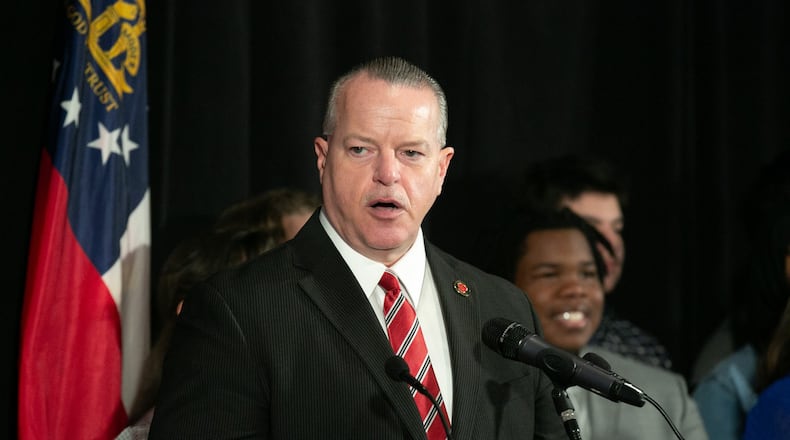News from the Cobb County health department show some coronavirus metrics are improving there, but Superintendent Chris Ragsdale said the Labor Day weekend will mark a pivotal point in the district’s plan to reopen schools.
The superintendent said earlier that once new cases of coronavirus reached lower levels, plans will be made to bring back students for in-person classes. While the rate of coronavirus being detected per 100,000 population is falling in Cobb, it hasn’t quite dropped to the mark Ragsdale set. Two other benchmarks set by the district — improved contact tracing and more efficient COVID-19 testing — have also not happened, Ragsdale said.
Ragsdale spoke with The Atlanta Journal-Constitution Tuesday, to say the latest numbers indicate the data is “definitely trending in the right direction.”
Dr. Janet Memark, district director of Cobb & Douglas Public Health, said Tuesday that the 14-day case rates per 100,000 people have dropped below 300 in both counties. According to the Georgia Department of Public Health, the latest 14-day case rate per 100,000 in Cobb is 248, and 197 in Douglas as of Aug. 25.
Two weeks ago, the numbers were 419 cases per 100,000 people in Cobb and 365 for Douglas, the Georgia Department of Public Health reports. While the numbers are still classified as high, Dr. Memark said both counties appear to be experiencing decreased community spread.
“The improvements that we continue to see is a direct effect of our community doing what they need to do to keep this virus at bay: Wearing masks, watching their distance, washing their hands, and avoiding large crowds,” Dr. Memark said in her newsletter.
The Cobb County School District began the 2020-21 school year Aug. 17 with remote learning only. The district drew up a phased approach to reopen classrooms for in-person teaching, but no date was attached to the plan.
Ragsdale previously said the district would consider reopening schools only after the county’s 14-day case rate drops to around 200 per 100,000 people, and if the health department improves its COVID-19 testing timeline and contact tracing.
He said he hopes the numbers of cases continue their downward trend, but warned Cobb County experienced a spike in cases after people took vacations in June and early July.
“We are holding our breath that the Labor Day holiday does not result in the same type of situation,” he said.
Ragsdale said the two additional metrics — improved contact tracing and effective COVID-19 testing timelines — go hand-in-hand. Under the current guidelines for contact tracing, Ragsdale said teachers would be required to provide contact information to a school nurse whenever a student tests positive for COVID-19. The nurse would pass along those details to the local health department. The superintendent said this is problematic because it could affect a teacher’s ability to do their job.
If there’s a four- to five-day delay to get tested and it takes another several days to get results, Ragsdale said the teacher could have to go back as far as 10 days to see which students and staff members were within six feet of the infected student for more than 15 minutes.
“That task is just ultimately complex, and putting that teacher in that position is not why they are there,” he said.
Cobb and Douglas Public Health throughout the summer has been pressing local school systems to set up internal teams to help school nurses with contact tracing, said agency spokeswoman Valerie Crow. Crow also said the department has also shared the web link to the Johns Hopkins online contact tracing course for team members to use.
Once a school passes contact tracing information on to the health department, its team members call people on the list and begin monitoring them for COVID-19 symptoms, Crow said. They also educate them on testing and the quarantine time period within 24 to 48 hours of receiving the list, she said.
Some Cobb parents continue to be critical of the district’s decision to hold remote classes for students. Parent Greg Tuttle believes the district should not only look at COVID-19 numbers, but also review statistics about the benefits of in-person education, which he said show elementary school-aged children are less likely to suffer severe symptoms when they catch coronavirus. If given the choice of either virtual learning or in-person classes with a mask requirement, Tuttle said he would choose the latter “as I’m sure many other in-person choice advocates would.”
“However, Cobb County has not provided that choice,” he said.
Cobb County schools, the second largest district in the state with around 110,000 students, is using its Cobb Teaching and Learning Platform for remote learning. On Tuesday, the platform suffered a database processing issue that prevented some students from logging on for about two hours.
Ragsdale said the platform has had a “rocky start,” but the district has worked to address issues as they arise.
“That does not negate the level of frustration for students and teachers and parents, and we are totally aware of that and we are doing everything we can to make sure this is smoothed out,” he said.
One parent, Angel Nair, told Cobb school board members that while she was initially opposed to digital learning, she went into the experience with an open mind. Nair has three children in the system in the sixth, third and first grades.
However, after a week of remote learning, Nair said she is “frustrated and heartbroken that my children aren’t getting the level of learning that they deserve.”
“This format just isn’t working for my elementary school kids,” she said. “It’s not ideal but a bit easier for my sixth-grader, though he still is struggling through. I have bright and well-behaved kids so if they’re struggling, I know we are not alone.”
“I want everyone to know that we definitely hear the level of frustration, but at the same time, the technical hiccups that we are experiencing is not the reason to say that we have to come back to face-to-face,” Ragsdale said. “We’re coming back face to face when it’s safe.”
Connie Jackson, president of the Cobb County Association of Educators, said she’s happy to see Ragsdale is “using science to make his decisions” and following guidelines from Cobb & Douglas Public Health.
“I think following the science is key in making sure we provide the safest environment for students, but also for our employees,” she said.
About the Author
Keep Reading
The Latest
Featured



